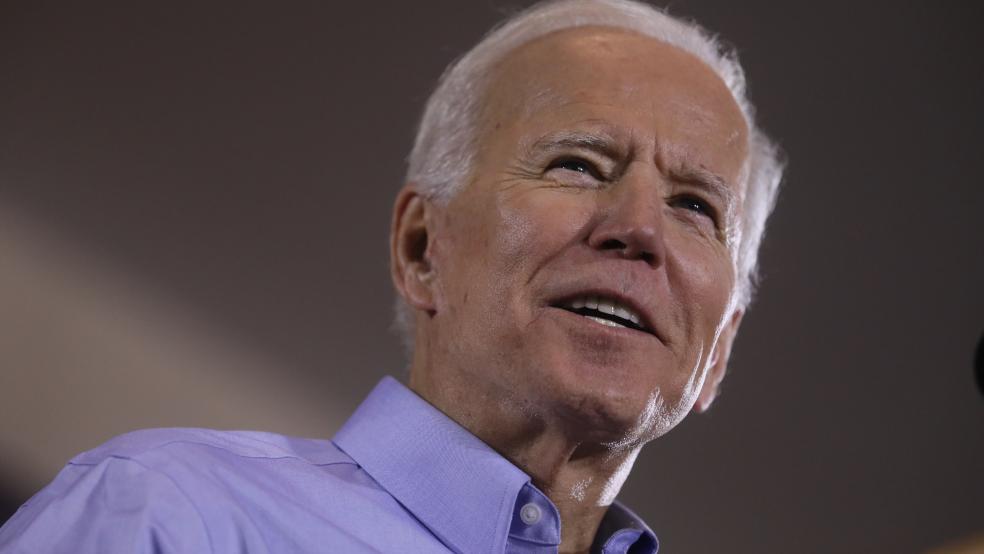The Democratic divide on health care and Medicare for All is fully in the political spotlight this week.
In his first official campaign speech, former Vice President Joe Biden on Monday said he supports giving Americans the option of buying into a Medicare-like plan. The position that sets Biden at odds with Sen. Bernie Sanders (I-VT), a rival for the 2020 Democratic presidential nomination, who continues to champion a single-payer “Medicare for all” system and the virtual elimination of private insurers.
“Healthcare is a right, not a privilege,” Biden said during a campaign event in Pittsburgh. “Whether you’re covered through your employer or on your own or not, you should have the choice to buy into a public option plan for Medicare — your choice. If the insurance company isn’t doing right by you, you should have another choice.”
Biden’s plan would create a new government option, available through the Affordable Care Act exchanges, that would compete with coverage options from private insurers. Employers reportedly would also be able to buy into the public plan.
The Sniping Is Starting
“We are all trying to get to a place where we achieve universal health care. I think he sees it like that,” a Biden adviser told The Washington Post. “But if they want to go after him and Obama about their approach to health care, bring it on.”
A Sanders aide fired back, criticizing Biden for attending a private fundraiser with a health insurance executive. “Anyone defending the current dysfunctional system needs to explain why the average family should have to pay $28,000 a year for health care, while the CEO of Independence Health Group Daniel Hilferty made $4.8 million last year,” the aide said in a statement to the Post.
The political divide was evident again Tuesday as the House held its first hearing on Medicare for All. Some on the left had expressed concern that the lineup of expert witnesses would present less-than-full-throated support for Medicare for All, especially given House Speaker Nancy Pelosi’s self-proclaimed agnosticism on the idea. In the end, activist Ady Barkan, who has Amyotrophic lateral sclerosis, was added to the roster of witnesses. “If the richest nation in the history of the world really decided to, we could guarantee health care as a right and we could probably do it more quickly than people think but the problem is right now we’re not even trying,” Barkan told lawmakers.
“For single-payer supporters, it is an achievement all on its own that House Democratic leaders agreed to hold a hearing at all on their proposal to completely overhaul American health care,” Vox’s Dylan Scott notes. “But that jubilation has been tempered by the nagging idea the Democratic establishment is still working to undermine Medicare-for-all.”
Why it matters: “If private health insurers are one day put out of business by a government-run single payer health system, they may look back at Tuesday as the beginning of the end,” Bloomberg’s Erik Wasson and Alexander Ruoff say. “Yet the bill coming before the House Rules Committee won’t become law anytime soon and may never get a hearing in the committees that oversee Medicare.”
Even so, this week’s developments, including Biden’s embrace of a public option, are a sign of how dramatically the health care landscape has changed since the Affordable Care Act was being debated a decade ago. “The notion that a Medicare public option is now seen as a moderate idea shows how much the health-care debate has shifted among Democratic candidates,” Larry Levitt, of the nonpartisan Kaiser Family Foundation told the Post. “It doesn’t go as far as Medicare-for-all in simplifying the system, but it may avoid some of the political pitfalls.”
Those incremental steps aren’t good enough for supporters of a single-payer system. The question is whether Democratic primary voters will be swayed by progressives’ arguments that the system needs to be overhauled, or by centrists’ concerns that Medicare for All may be too radical a change for a party trying to ensure President Trump doesn’t win a second term. “Health care was a winning issue for Democrats in 2018,” says Axios’s Caitlin Owens, “and the party is still trying to figure out what would be a winning health care message in 2020 — playing it safe or swinging for the Medicare for All fences.”
What’s next: The Congressional Budget Office is due to release a report on Wednesday on the costs and effects of Medicare for All. And the House Ways and Means Committee has agreed to hold a hearing on Medicare for All legislation put forth by House progressives.





